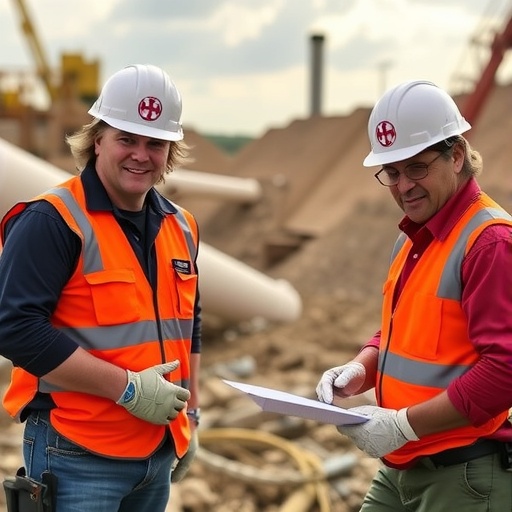As the demand for critical minerals continues to surge globally, the minerals industry—which underpins essential technologies in high-tech manufacturing, defense applications, and renewable energy—confronts a significant challenge: a shortage of skilled professionals equipped to sustain and innovate within this vital sector. Recognizing this dire need for trained expertise, University of Houston Associate Professor of Information Science Technology Xuqing (Jason) Wu has spearheaded a transformative $1 million initiative funded by the National Science Foundation, aimed at cultivating the next generation of mining and mineral experts through cutting-edge education and immersive training programs.
Critical minerals and rare earth elements are the lifeblood of modern civilization, powering everything from smartphones and laptops to electric vehicles and geothermal energy systems. Elements such as copper, lithium, and rare earth metals form the backbone of electronic circuits, batteries, and advanced manufacturing components essential for sustaining the digital age. Additionally, traditional materials like stone, cement, and coal remain inseparable from infrastructure and energy sectors. The complexity and breadth of mineral applications underscore an urgent imperative to secure a stable domestic supply chain through well-prepared professionals adept in multidisciplinary scientific and technological skills.
Professor Wu underscored the national risk inherent in the current educational gap, noting, “Without targeted educational programs, the U.S. risks falling behind in securing a stable domestic supply of critical minerals.” This stark warning highlights the geopolitical and economic consequences that may arise if workforce development does not keep pace with demand. The initiative not only addresses this skills deficit but also endeavors to revolutionize public perception of the mineral sector, often overlooked despite its rapid evolution into a highly sophisticated, technology-driven industry.
Historically, mineral extraction dates back to prehistoric times when early humans sought materials such as meteorites for their metallic properties. Fast forward to today, the mining industry remains fundamentally about extracting resources from the earth but now operates at the cutting edge of innovation, incorporating autonomous machinery, artificial intelligence, real-time geospatial data analytics, and advanced environmental monitoring systems to optimize efficiency and mitigate ecological impact. This technological infusion into a traditional sector epitomizes the transformation from manual labor to smart, sustainable mining.
The educational program led by Professor Wu melds hands-on experiential learning with rigorous academic instruction, representing a model for workforce development in applied sciences and engineering. The initiative partners with key industry stakeholders to provide mentorship and real-world training, fostering competencies in geosciences, materials science, data analytics, and environmental engineering. By targeting high school and community college students—demographics often underexposed to mining-related career pathways—the program creates a vital talent pipeline across multiple educational levels, building technical expertise and career readiness in tandem.
Each year, approximately twenty students from the Houston area will receive sponsorship, mentorship, and participation in an intensive four-week training camp featuring immersive, field-based learning exercises. These experiences are designed to equip students not only with theoretical knowledge but also with practical skills in data acquisition, mineral identification, environmental compliance, and digital instrumentation. The initiative’s interdisciplinary approach integrates insights from Earth sciences, electrical and computer engineering, and information science, embodying the future of mineral industry education in addressing complex, real-world challenges.
Highlighting the broader societal impact, the program is committed to reshaping the narrative around mining and minerals as a dynamic, high-tech domain pivotal to America’s energy security, national defense, and advanced manufacturing sectors. Emerging technologies now enable environmentally responsible extraction and resource management, advancing both economic and sustainability goals. Through this lens, the industry transcends its outdated reputation, emerging as a fertile ground for innovation and scientific inquiry.
Collaboration among academic departments is central to the initiative’s success. Co-principal investigators at the University of Houston contribute diverse expertise encompassing geochemistry, mineral processing, environmental impact assessment, electrical engineering systems, and information technologies for mining operations. This interdisciplinary synergy fosters innovative curriculum development and research endeavors that align closely with industry trends and workforce needs in mineral exploration and resource management.
The technical curriculum also emphasizes emerging digital tools—such as drone-based geological surveying, machine learning algorithms for ore grade prediction, sensor networks for environmental monitoring, and digital twins for mine planning—to prepare students for careers in a digitally transformed mineral sector. This integration of digital methodologies enhances efficiency and safety while providing students with market-relevant skills that intersect with growing fields like data science and automation engineering.
By directly engaging students through mentorship by seasoned industry professionals, the program imparts critical soft skills alongside technical knowledge, including project management, teamwork, communication, and ethical considerations in resource extraction. This holistic approach ensures graduates are not only technically proficient but also attuned to the environmental and societal dimensions of mineral development, aligning workforce capabilities with sustainable practices.
The Houston-based initiative also aims to serve as a replicable model across the United States, addressing a nationwide shortage of qualified mineral engineers, geoscientists, and data scientists integral to maintaining and expanding the country’s critical mineral supply chains. The program’s framework could inspire similar educational strategies elsewhere, aligning academic institutions with industry to future-proof the minerals workforce against evolving technological and environmental demands.
In summary, this groundbreaking educational effort led by Professor Xuqing (Jason) Wu represents a strategic response to an urgent national priority. By combining advanced technical training, industry partnerships, and innovative pedagogy, the project seeks to empower a new generation of mineral experts capable of driving the technological and sustainable advancement of an industry critical to the 21st-century economy. As demands on the minerals sector intensify with the global transition to cleaner energy and smarter technologies, initiatives like this will prove essential in securing the expertise needed to fuel innovation and maintain economic resilience.
Subject of Research: Workforce Development and Education in Critical Minerals and Mining Technology
Article Title: University of Houston Launches $1 Million NSF-Funded Program to Train Next Generation of Critical Minerals Experts
News Publication Date: Not specified
Web References: https://mediasvc.eurekalert.org/Api/v1/Multimedia/84a0fa5c-4758-41be-bd47-3ef6425c183e/Rendition/low-res/Content/Public
Image Credits: University of Houston
Keywords: Applied sciences and engineering, Technology, Geology, Physical geology, Scientific community, Education, Education technology, Educational levels, Educational programs, Engineering, Environmental sciences, Environmental engineering, Geological engineering




